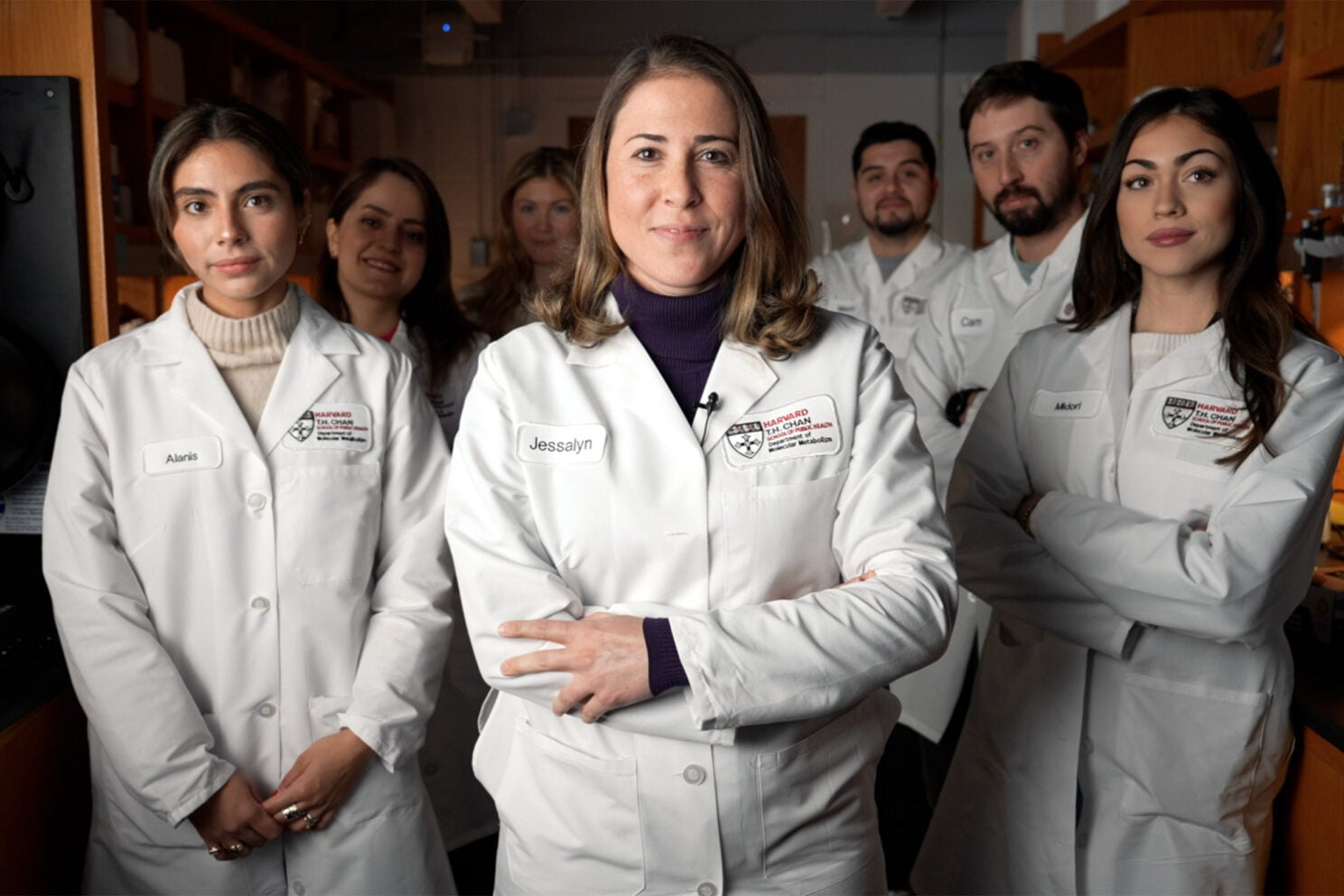Health
Potential link to an everyday food in cancer findings

Jessalyn Ubellacker (center) with her team at the Harvard Chan School.
Photo by Anna Webster
Oleic acid, key component of olive oil, implicated in metastasis — but investigators emphasize the need for more clarity
A closer look at cancer has implicated oleic acid, a key component of olive oil, in the progression of the disease from the original tumor to distant organs, or metastasis.
The investigators stressed that their research is complex and ongoing, and noted that the findings do not negate previous findings suggesting that olive oil can help lower the risk of cardiovascular disease and other health problems.
For decades, a major focus of oncology has been preventing metastasis. As a result, early detection programs have been devised for breast, skin, colon, and other cancers, raising the chances of successful treatment.
The lab of Jessalyn Ubellacker, an assistant professor of molecular metabolism at the Harvard T.H. Chan School of Public Health, is exploring links between diet and cancer spread and has found that malignant cells pick up a protective, fatty coat of oleic acid in the lymph nodes. That coat acts as a shield against free radicals, reactive molecules in the bloodstream that can attack the walls of unprotected cancer cells, destroying them.
“We believe that when cancer cells travel through the bloodstream, they face challenges in adapting to this environment,” Ubellacker said. “During this process, they undergo oxidation from free radicals that essentially tear away at the phospholipid layers of the cell — the cell membranes.”
“We are focusing on understanding instances when patients already have cancer and it’s already metastasizing.”
Jessalyn Ubellacker
There is no clear evidence of a link between dietary olive oil and the spread of cancer, Ubellacker stressed. In fact, researchers believe that the body itself is a key source of the fats picked up by cancer cells in the lymph nodes. The team is now exploring whether additional oleic acid in the diet plays a role in this process and, if so, whether it can be manipulated to influence the likelihood that cancer will spread.
“If we could find ways to control or mitigate cancer metastasis, then cancer wouldn’t have the same capability to cause the same level of damage, morbidity, and mortality,” said Ted James, an associate professor of surgery at Harvard Medical School and chief of breast surgical oncology at Beth Israel Deaconess Medical Center.
James is working with Ubellacker on a study of diet and metastasis among 50 women with breast cancer. “It’s really an untapped area,” he said.
The research, begun when Ubellacker was a postdoc at the University of Texas Southwestern Medical Center in Dallas, also puts the spotlight on what she calls the body’s “forgotten system”: the lymphatic system. Like the circulatory system, the lymphatic system consists of a network of plumbing-like tubes that branch down to fine capillaries. Its primary jobs are to support the immune system and to drain excess fluid from tissues and redistribute it back into the bloodstream. Along the way, it removes waste and plays an important role in fat metabolism. Lymph nodes distributed throughout the body are also a common site of cancer spread.
Ubellacker, whose research is supported by the Medical School’s DF/HCC Incubator Award and the Breast Cancer Alliance Young Investigator Award, emphasized that the work is in a separate category from research suggesting that olive oil can reduce a person’s risk of cancer, heart disease, and other illnesses. Her focus is on the broader picture.
“Cancer that’s disseminating is a very different story from initial cancer development, with regard to how cancers use fats for protection,” she said. “We are focusing on understanding instances when patients already have cancer and it’s already metastasizing.”
The Chan School is a fruitful place to explore this and related questions, Ubellacker said, because she can collaborate with both Chan School epidemiologists and clinical researchers at Harvard-affiliated hospitals.
One project recently up and running is a collaboration between Ubellacker’s lab and Chan School and Medical School researchers that draws from the Nurse’s Health Study and Nurse’s Health Study II. For more than three decades, respondents have answered detailed questions on health and diet and provided blood samples that can be analyzed to create lipid profiles. The data will guide lab experiments zeroing in on diet, fats, and cancer metastasis.
“Nutrition researchers at the Chan School have shown the health benefits of the Mediterranean diet and plant-based foods, including fats,” Ubellacker said. “We’re looking at those exact data sets to see whether the lipid profiles are related to subsequent breast cancer diagnoses with or without lymph node involvement.”
The collaboration with James, who co-directs BIDMC’s BreastCare Center, is more tightly designed. The study will collect dietary information and obtain samples from the lymph nodes of 50 breast cancer patients. Researchers will examine those samples for 300 different fats and metabolites — metabolically active molecules — to identify differences among participants.
“Understanding how the process of metastasis happens and to be able to intervene and prevent it from happening, that’s where the real opportunity is,” said James.

